The Sun Will Never Set On The Spirit Of Jimmy Buffett
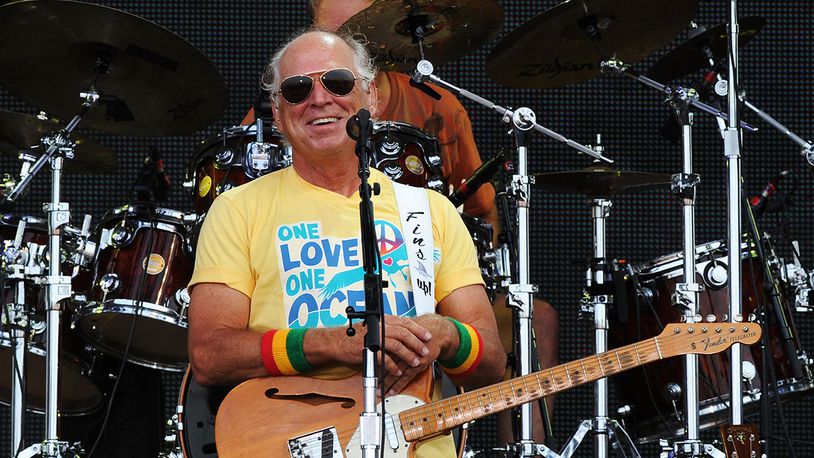
Jimmy Buffett was a best-selling author, songwriter, businessman, airplane pilot, sailor, surfer, father, husband, environmentalist, tequila drinker, dog lover, and more. Yes, he lived a huge life.
Buffett died on Sept. 1 from cancer. He was 76 years old.
The thread of all his magical pursuits is how he paid attention to detail.
Jimmy Buffett listened for every heartbeat.
He found a twinkle in the eyes of everyone he met.
I have dozens of Buffett stories. Twice I brought Richard Harding and his daughter Catherine to Buffett shows in the Chicago area. Richard Harding was the grizzled owner of the Quiet Knight music room south of Wrigley Field. The Quiet Knight was where Buffett got his Chicago start in the early 1970s.
The last time we were all together was in July 2011 when Buffett played Toyota Park in Bridgeview. My “date” was Minnette Goodman, the tiny mother of the late singer-songwriter Steve Goodman. She was 84 years old. I’ll never forget Minnette holding her own against the torrent of beachballs and hands-in-the-air fins signals. Buffett was friends with her son and family.
Buffett asked to meet our group backstage before the show. I don’t do backstage, but I’ll always remember Buffett taking at least a half-hour to talk to Richard Harding underneath the shade of a golf cart. He spoke with Minnette. Then, during the concert he paid tribute to Richard and Minnette. Richard and Minnette would both die a year later.
Hello in there.
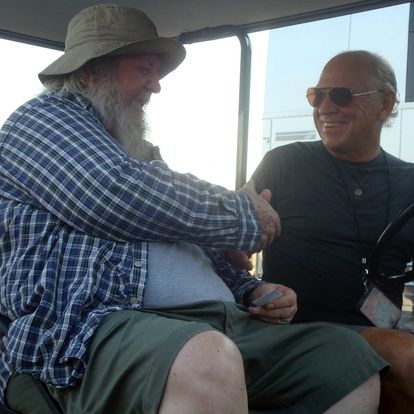
Richard Harding and Jimmy 2011. (Courtesy of Catherine Harding)
The first time I took the Hardings to see Buffett was in July 1991 when he appeared at Poplar Creek in suburban Hoffman Estates.
This odd road trip included then-Bulls-guard John Paxson and his wife. This group of Chicagoans piled into my car. Before the show, we rolled into the since-closed Penny Road Pub in Barrington. Before the concert the Hardings brought Buffett some artwork made by the late Eddie Balchowsky (1916-1989).
Balchowsky was a poet, one-handed piano player and Spanish Civil War veteran who worked at the Quiet Knight and inspired Buffett’s hit ballad “He Went To Paris.” During this concert at the last-minute Buffett included an acoustic version of “He Went To Paris.” With his omnipresent pens and pencils in his tattered shirt pocket, the white-bearded Harding was surprised and happy. I remember the tear in the eye of Harding’s daughter.
Jimmy Buffett was fiercely loyal.
I started writing about him in June 1982 for the Illinois Entertainer when he opened for Bonnie Raitt at Poplar Creek. There were no “Parrotheads” back then and he often gave me credit for helping to build his Chicago audience. At least that’s what the Chicago Sun-Times advertising department told me when Buffett’s camp always took out full-page ads for our newspaper. I think that may be why we kept in touch over the years. He never forgot. He never turned down an interview request and came on my WGN-AM radio show at a moment’s notice. I mean, I’m no big deal.
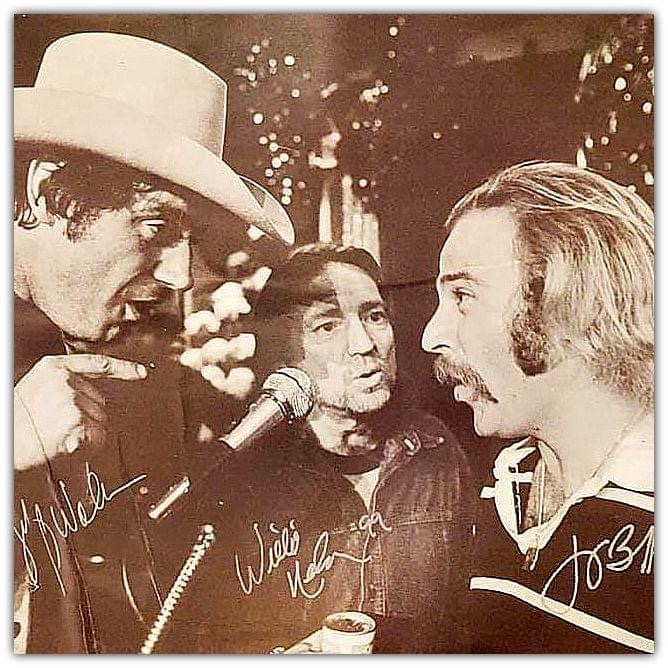
From left: Jerry Jeff Walker, Willie Nelson, Jimmy. (Via Willie Nelson.)
Buffett began his career as a journalist, writing in detail for Billboard magazine in Nashville and then playing clubs. He earned degrees in history and journalism from the University of Southern Mississippi.
His media friends included the late 60 Minutes correspondent Ed Bradley and the beloved CBS-TV anchor Walter Cronkite. Buffett and Cronkite were sailing pals at Martha’s Vineyard. Buffett sang to Cronkite as the newscaster was on his death bed and he sang “Son of a Son of a Sailor” at Cronkite’s 2009 memorial service.
Buffett was the first to tell you that he was a nobody in Nashville. Things broke for him the right way in 1971 when the late Jerry Jeff Walker and Buffett left Nashville for Key West, Fla. I always heard a bit of the melody lines of Merle Haggard in Buffett’s earliest recordings and indeed, when Buffett and Walker wrote “Railroad Lady,” Haggard covered it.
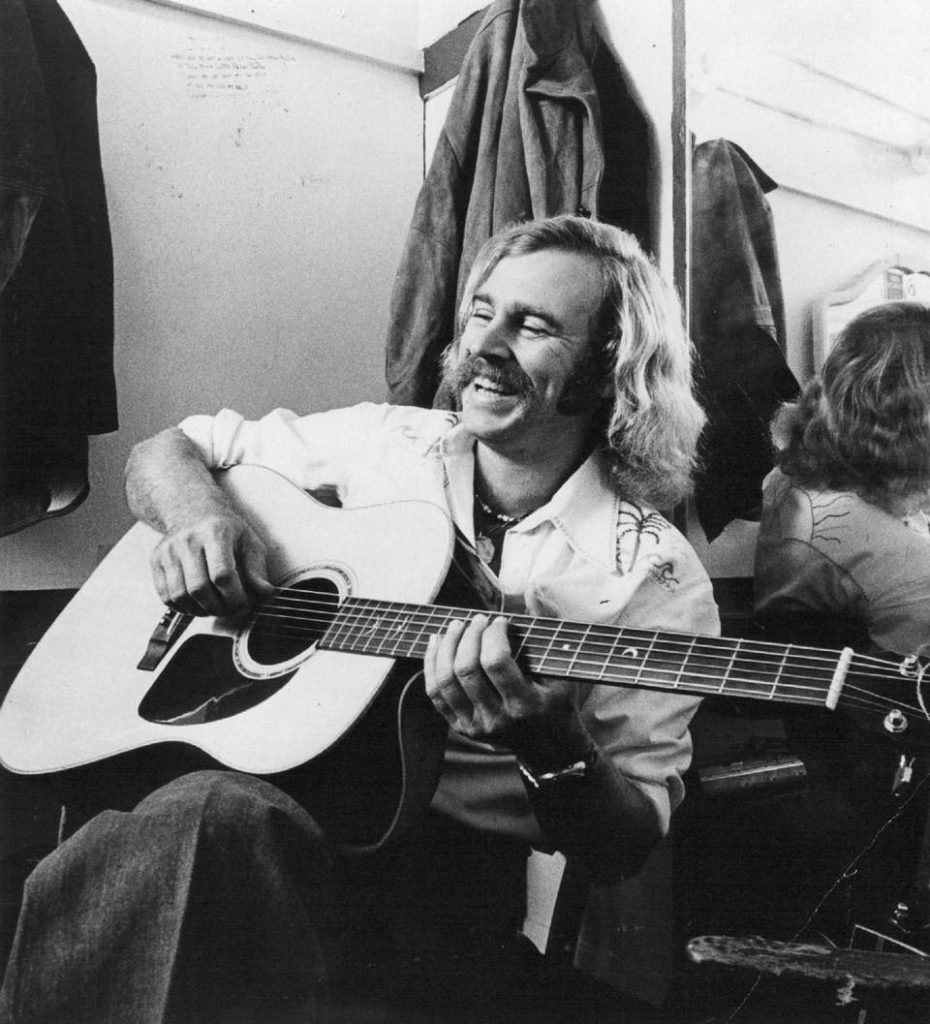
The under-championed songwriter Fred Neil (“Everybody’s Talkin”) entered Buffett’s orbit in Florida and through a Neil line Buffett arrived at his big passage to adventure: “I’m going where the sun keep shinin’/Through the pourin’ rain/Goin’ where the weather suits my clothes.”
Neil, who died in 2001, founded the Dolphin Research Project to stop the exploitation of dolphins. Neil became a recluse who never released anything after a 1971 live album. “I was in awe of Fred Neil,” Buffett told me in 2003. “[Author] Jim Harrison and I were driving around Florida doing some documentary that never got produced. We stopped in for a beer at Alabama Jack’s [in Key Largo] and as I was walking out this voice called out, ‘JIMMY!’ And there was Fred Neil crabbing at the end of the pier, in a bathing suit and a pair of flip flops. He really was what he was. It was sad to me in the end that none of us knew he was there.”
Buffett’s 1977 pop hit “Margaritaville” was about soothing the pitfalls of tropical tourism with an adult beverage and that changed more than everything for him.
Buffett was a more sophisticated songwriter than most people gave him credit for. Bob Dylan covered “A Pirate Looks at Forty” in concert. Buffett was a Harry Belafonte fan and his Coral Reefer Band featured the Trinidadian master steelpan player Robert Greenidge. One time we talked about how great it would be for Belafonte and Buffett to tour together. Buffett enjoyed dabbling in Carolina Beach Music and brought in Beach Music legends the Tams to sing on his 1999 “Beach House on the Moon” album that was recorded in Muscle Shoals, Al.
Buffett’s music created a strong sense of community and his lyrics were hopeful and fun. Who doesn’t like that? Later in his life, some lyrics became poignant. In 2014 he recorded “Oldest Surfer on the Beach” with Mark Knopfler:
“I stopped searching for perfection/many waves ago
What matters is the here and now/And that’s about all I know…
…There’s nothing that I want to do/No place I’m trying to reach
Only time is now more precious to/The oldest surfer on the beach….”
Buffett was proud to be an adopted Chicagoan. Next time you are at Navy Pier in Chicago, wander into the Margaritaville cafe on the pier. Look towards the skies at the horizontal photo from the album cover for Steve Goodman’s “Somebody Else’s Troubles” album. On Aug. 7, 1972 Goodman called his favorite musical pitchers in from the bullpen for the photo session in his apartment at 3759 N. Wayne, not far from Wrigley Field.
The team included Buffett (identified as Marvin Gardens on the album cover), Earl Pionke, the larger-than-life owner/White Sox fan of the Earl Of Old Town folk music club, Goodman’s best friend John Prine, singer-songwriters Fred Holstein and his brother Ed. And now Ed is the last man standing.
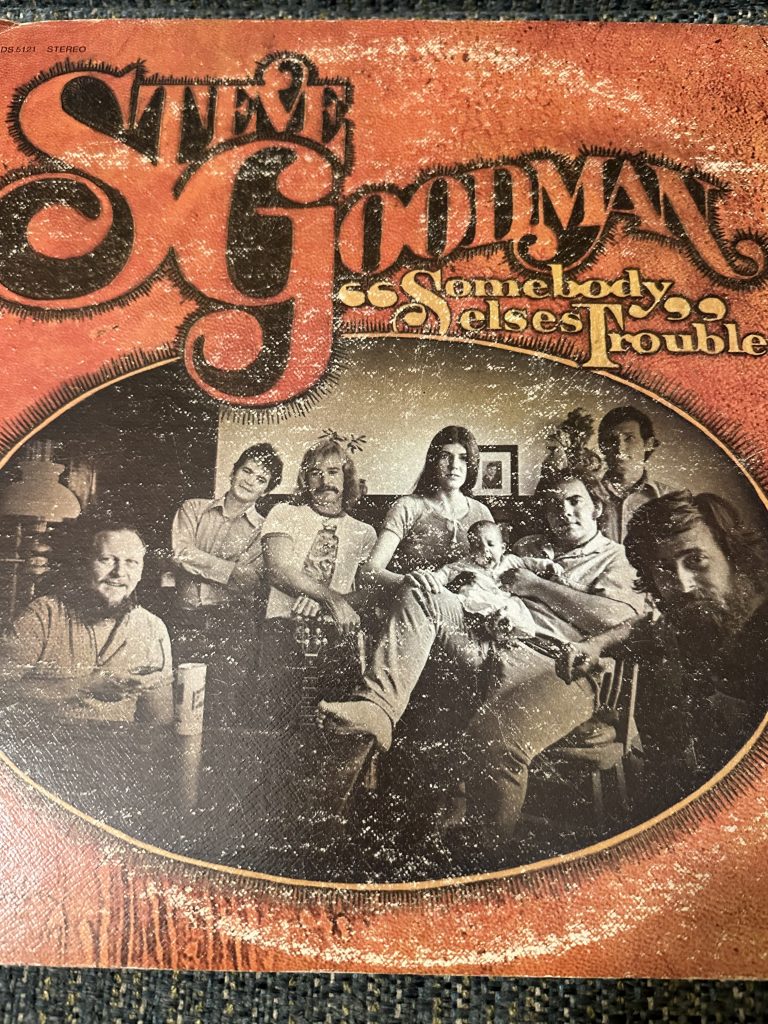
From L: Earl, John Prine, Jimmy, Nancy Goodman with husband Steve and daughter Jessie; Fred and Ed Holstein. Ed is the last man standing. (From the author’s collection.)
Buffett had his first major market success in Chicago. He would co-write “Door Number Three” and “Frank and Lola” with Goodman. He opened for Dan Hicks and the Hot Licks, Neil Sedaka ,and others at the Quiet Knight. “I was loyal to Richard,” Buffett told me in 2011. “He played me there many times and I stayed when I started getting a following. That’s how it was then.”
Buffett was born in Pascagoula, Miss. but he connected with the artistic warmth of big city Chicago. “It is a Chicago style not necessarily identified with the city,” he explained in 2011. “There were just so many good people doing solo acoustic guitar shows. The Holstein brothers, Bonnie Koloc, Mike Smith.” Buffett and Smith recorded the novelty single “Elvis Imitators” under the pseudonym of Freddie and the Fishsticks and Goodman popularized Smith’s “The Dutchman.” Smith died in 2020 at the age of 78.
“And those singer-songwriters also had to be comedians and emcees,” Buffett continued. “I had to do that in my early New Orleans days. Stephen Stills and [Eric] Clapton were the guitar players I idolized. My natural strength seemed to lie in the ability to bullshit on stage. I had that talk with myself. I thought, ‘It’ll take a lot of hard work and practice. After New Orleans, when I got to Chicago I worked places that were minor league ballparks, the Steak & Ale circuit. So meeting all those people in Chicago was a renaissance for me. They were great storytellers, bullshit artists on stage and performers. I gravitated toward that. I found my place.”
The hard work and practice paid off. Buffett is the only billionaire I ever talked to.
He was thrilled to be the first stand-alone concert in the history of Wrigley Field. Ironically, his “Labor Day Weekend” shows took place on Sept. 4 and 5, 2005.
In the summer of 1984 the Cubs hosted short post-game concerts featuring acts like Big Twist and the Mellow Fellows, Chuck Berry and Mike Jordan and the Rockamatics on a portable stage in right field—to encourage fans to hang around the neighborhood.
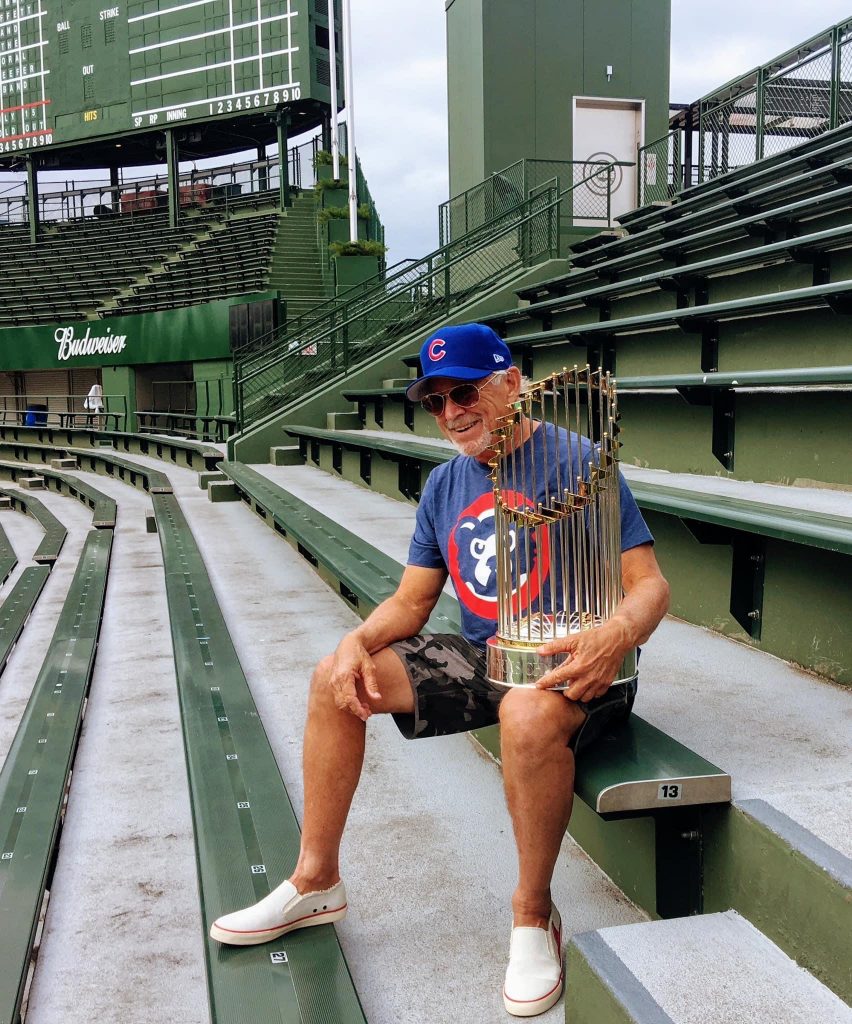
The approximate area from where Steve Goodman watched the Cubs lose.
On Oct. 2, 1984, the Cubs opened the National League Championship Series against the San Diego Padres. Buffett flew to Chicago to sing the national anthem in honor of his buddy Steve Goodman. An intense Cubs fan, Goodman had died of complications from leukemia just four days before the Cubs clinched the Eastern Division title. The skies were clear and the Cubs throttled the Padres 13-0. It was the Cubs first post-season appearance since 1945.
Buffett was so excited about singing the national anthem that he went to bed early the night before the game and practiced the anthem in his hotel room. He was singing so loud he woke up the gentleman across the hall. In his 2017 and 2018 appearances at Wrigley Field, Buffett ended his concerts with an acoustic number from the right-field bleachers in the approximate area where Goodman sat with his guitar.
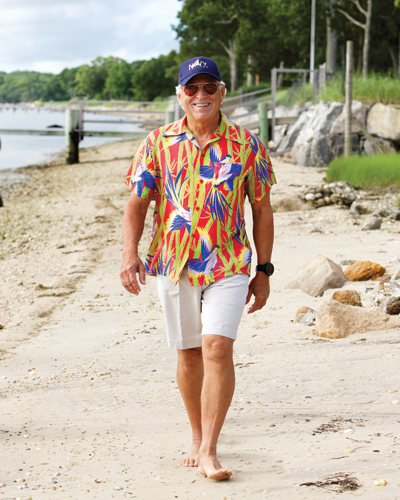
I profiled Buffett for a June 1990 cover story for Ford Times magazine. He told me he always kept journals on the road, and like John Prine, he found creative sparks in the enforced isolation of hotel rooms.
He recalled staying in a suite in North Carolina during the 1988 presidential campaign. “Jesse Jackson was having a party across the hall,” he said. “I had never met him, so I left a message that I wanted to stop by and say hello. I went to work that night, came back and there was a message that the Rev. Jackson had called back and I was to come over and say hello. Well, I assumed he meant the next day. So the next morning, I went over and knocked on the door. I heard a bunch of people talking, so I went in and said, ‘How y’all doing. I’m Jimmy Buffett.’ I looked around and found that Jesse had already checked out. The Pat Robertson contingent had checked in.”
Jimmy Buffett knew how to smile.
Buffett’s shrewd business acumen was already in full force at the time of this 1990 conversation. He explained, “If you can control your destiny, then you’re not at the mercy of other people telling you how to run your life. And–if you can do that—which most people can’t—then opportunities present themselves.”
There was a bit of a Zen quality to Buffett. He did live in the moment. He had a generous essence. He raised $1 million for Friends of Florida to save the 407-acre Key West salt marshes, the island’s only remaining section of underdeveloped land. In 1987 he appeared before Congress to lobby for the reauthorization of the Endangered Species Act, referring to the endangered manatee. At one time he dreamed about bringing minor league baseball back to Key West. In 1974 and 75 the Cubs had an affiliate in Key West that featured future Hall of Famer Bruce Sutter.
Buffett introduced me to the Iguanas in a Miami club and in 1992 while we were flying over Indiana he told me how he was trying to broker a tour with the Grateful Dead: Parrotheads meet the Deadheads. He and Jerry Garcia were talking about it at the bar of the Chicago hotel they were staying at. Garcia would die in 1995.
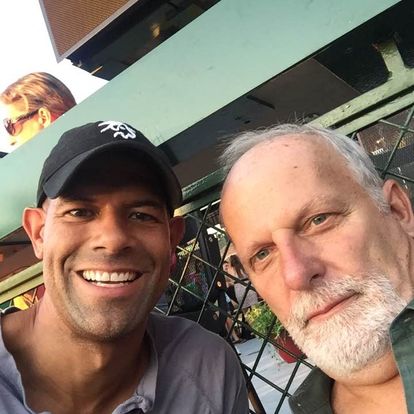
The time I ran into former NBA star Shane Battier at a Wrigley Field Buffett concert.
I love this story from my old Chicago pal Anthony Potenzo, which he posted on Facebook Saturday afternoon from New Orleans.
Around 1983 Buffett came into the Palm restaurant in Chicago where Potenzo was a waiter. “He was cool as hell, and left a fat tip,” Potenzo wrote. “As I was leaving between shifts, he was waiting for his ride with his pal in front of the hotel. I thanked him again and he asked where they should go tonight. I said, ‘I’m going to my buddy’s club, Smart Bar.”
He looked at his pal, then me, and said with a smile, ‘they ain’t lettin’ us in there!’ A life well lived.”
Jimmy Buffett did not postpone joy, a lesson we all can remember. His vibe helmed a lovely cruise that got me through the ups and downs of my life. And no worries at all if you’re new, curious, or even cynical about this world. It is not too late to change course and listen to his music. Jimmy Buffett’s spirit is available to anyone with an open heart.

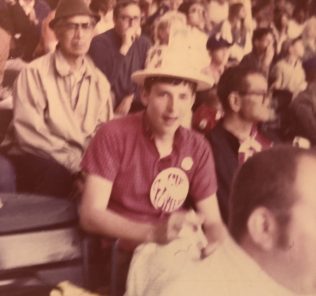
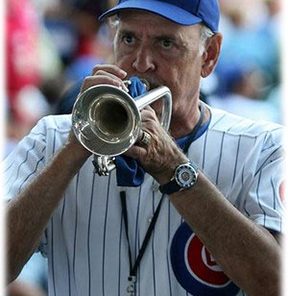
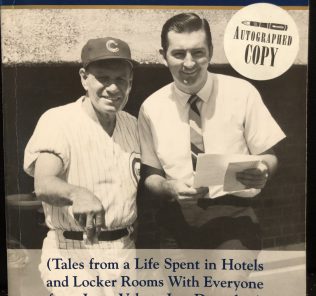
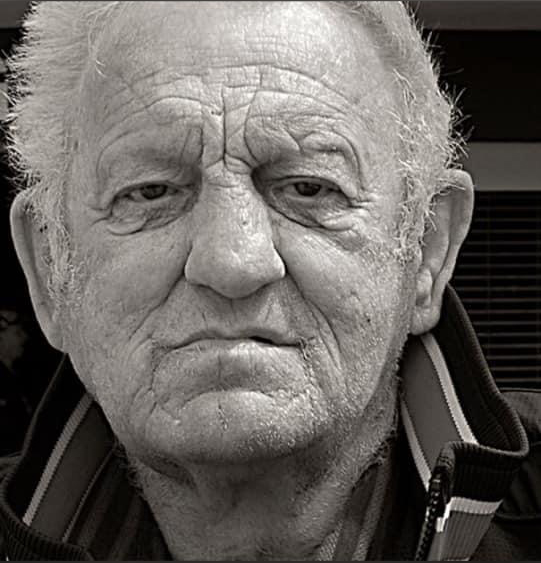


Leave a Response